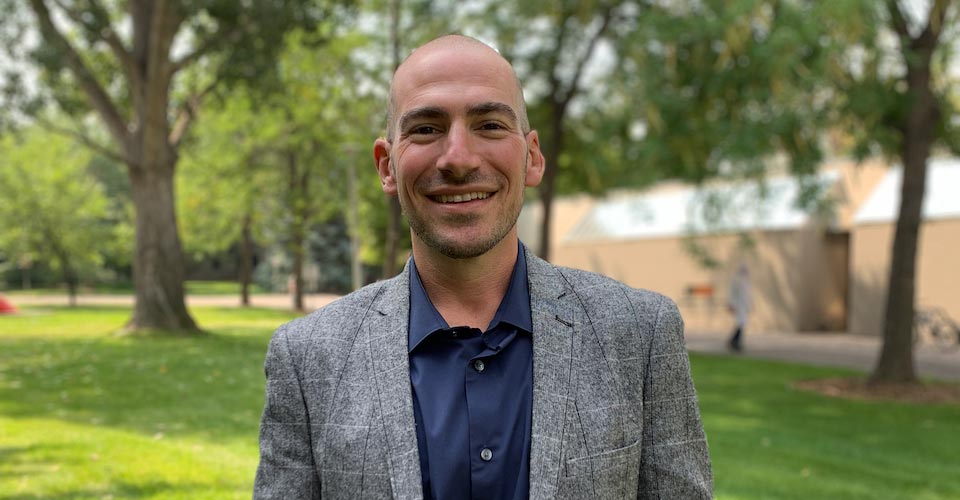
Justin Sambur, assistant professor in the Department of Chemistry.
Justin Sambur, assistant professor in the Department of Chemistry, has received a 2022 Sloan Research Fellowship. Awarded annually by the Alfred P. Sloan Foundation since 1955, the fellowships honor extraordinary U.S. and Canadian researchers whose “creativity, innovation and research accomplishments make them stand out as the next generation of leaders.”
Sambur, whose research interests span nanoscience, electrochemistry, solar energy conversion and catalysis, is among 118 early-career researchers selected for the fellowship this year. Fellows from the 2022 class include biologists, chemists, computer scientists, earth system scientists, economists, mathematicians, neuroscientists, ocean scientists, and physicists from 51 institutions across the U.S. and Canada.
Sambur received his doctorate from Colorado State University in 2011, and he returned as a faculty member in chemistry in 2016. Since then, he’s developed a research program focused on advancing imaging methods for energy-related research problems.
His team is developing microscopy and spectroscopy techniques that advance critical knowledge in basic energy science. One area of focus involves improving solar cell efficiency by avoiding energy losses incurred when high-energy light from the sun strikes a solar cell and is typically lost as heat. To capture this excess energy, Sambur’s lab is advancing ultra-thin, three atom-thick semiconductors that have unique physical and photophysical properties that would minimize energy loss. Then, they are using cutting-edge measurement strategies to characterize and ultimately control energy flow in these materials.Sambur’s team is also coming up with design principles for fast-charging battery materials. They are working to improve both the long-term durability and charging rates of batteries and finding new ways to measure their performance in single nanoparticle-level detail.
Sambur has a B.S. degree in chemistry from SUNY-Binghamton and, following his Ph.D. from CSU, he was a National Science Foundation postdoctoral fellow in the lab of Peng Chen at Cornell University.
His most recent awards include: The Royce W. Murray Young Investigator Award (2022), the NSF Career Award (2020), the DOE Early Career Award (2020), Scialog Fellowship: Advanced Energy Storage (2019), the Norman Edmund Inspiration Award (2017), and the Air Force Young Investigator Award (2017).
About Sloan Fellows
Sloan Fellowships are awarded to scholars in seven scientific technical fields and are chosen in close coordination with the scientific community. Candidates are nominated by fellow scientists and selected by an independent panel of senior scholars. Winners receive a two-year, $75,000 fellowship.
A Sloan Research Fellowship is one of the most prestigious awards available to young researchers, in part because so many past Fellows have gone on to become towering figures in science, according to the foundation. Renowned physicists Richard Feynman and Murray Gell-Mann were Sloan Research Fellows, as was mathematician John Nash, one of the fathers of modern game theory.
For five of the past six years, the recipients of the Nobel Prize in Physics have included former Fellows: Andrea Ghez (2020), James Peebles (2019), Donna Strickland (2018), Kip Thorne (2017) and Duncan Haldane (2016). In fact, 53 Fellows have received a Nobel Prize in their respective field, 17 have won the Fields Medal in mathematics, 69 have received the National Medal of Science, and 22 have won the John Bates Clark Medal in economics, including every winner since 2007.
CSU has had 17 past researchers win Sloan Fellowships, all from the College of Natural Sciences in either chemistry or physics. A database of all former Sloan Research Fellows can be found at https://sloan.org/fellows-database.